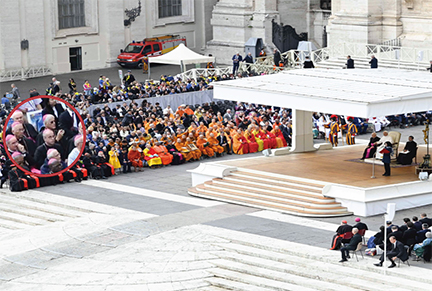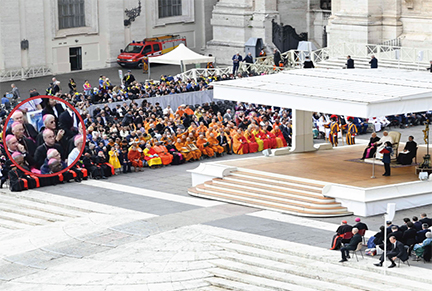By Bishop Joseph R. Kopacz, D.D.
In January 2026, The Holy Land Co-ordination undertook its annual mission to the land made holy by the incarnate presence of the Lord nearly 2,000 years ago. The Holy Land Coordination was initiated by the Vatican, the Holy See at the beginning of the third millennium in order to deepen the relationship between the Christian communities in Palestine and Israel with Catholic Episcopal Conferences in Europe, the British Isles, Canada and the United States. Its defining characteristics are pilgrimage, prayer, presence, and pressure or persuasion. The theme for 2026 was: A Land of Promise – Encounter and dialogue with People of Hope.
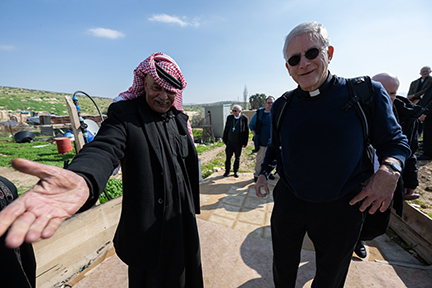
The pilgrimage included a visit to the Church of the Holy Sepulcher where we celebrated Mass at the Lord’s tomb on two consecutive days. The first moment of the resurrection dawned on this site when the risen Lord Jesus blessed men and women of every age with the hope and peace that the world cannot give and for which the Holy Land hungers and thirsts. The Eucharist was the heart of each day and especially meaningful when celebrated with various communities of biblical roots. This pilgrimage did not include the traditional holy sites marking the Lord’s life, death and resurrection, but rather an experience of the sacred each time the people of Palestine and Jerusalem opened their hearts and homes to us in wholehearted hospitality.
Along with pilgrimage and prayer, another pillar of the Holy Land Co-ordination is presence. Each encounter with diverse communities on the margins was an opportunity to humbly listen to their stories of daily hardship and yet to witness their resolve not to give up hope for a life of dignity and peace. Our presence was an embrace of hope, an assurance that they are not forgotten. Who are the marginalized in Palestine and Israel whose voices are barely heard during the current din of war and catastrophic destruction in Gaza in response to the heinous act of terrorism on Oct. 7, 2023.
At the outset, we sat with a Bedouin community who are visible from the highway that leads from Jerusalem to Jericho toward the Jordan River and the Dead Sea. Their ancient way of life is threatened daily by the intimidation and violence of the extremist Jewish settlers who want to drive them from the land. These nomadic tribes are recognized by law and so they seek legal recourse from the government over their plight, but their voices are barely heard, and their rights are routinely ignored. They were grateful that we spent time with them in conversation that continued over a traditional Bedouin meal. It was an affirmation of their dignity, a great gift for them and for us.
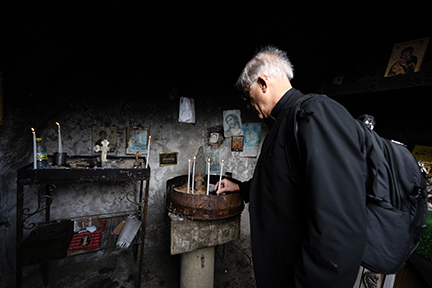
Throughout the West Bank many Palestinian communities have been under extreme duress and relentless pressure to leave their ancestral lands and villages either through internal displacement or external migration. We visited Taybeh – a Christian community of approximately 1,300 residents who are struggling mightily for their survival. We celebrated Sunday Mass and afterwards listened to the elders of the town who spoke about their struggle that has led to the forced migration of nearly 90% of their family members and neighbors. Extremist Jewish settlers destroy their olive trees, steal or kill the livestock, confiscate their land and cast a climate of fear over this besieged community. In the current climate especially, their voices go unheard, and their rights are relentlessly trampled. The Taybeh community is indicative of the evident diminishment of the Christian population in the Holy Land. Those who remain are long suffering and survive by relying on the generosity of those who left and have not forgotten them, as well as their own industriousness born of their love for their ancestral homeland. Courage and hope are renewed with visits such as ours. On another note, considered to be the first Palestinian brewery, Taybeh beer made on site is delicious, and provides much needed employment for some of the locals.
Leaving the West Bank, we visited the St. James Vicariate of the Latin Patriarchy which is comprised of Hebrew speaking Christians in Israel. They were eager to point out that they have lived peacefully for generations in the midst of their Jerusalem Jewish neighborhoods. Whereas Arabic is the mother tongue of the Palestinian population, the Hebrew speaking Catholic Christian is a rarity – 1,000 to 2,000 in the dominant culture of 8 million. They work tirelessly to teach the faith to the next generation of their children and youth, as well as to serve the Catholic migrants in Israel who come from the Philippines and other countries to shore up Israel’s work force.
We had the privilege of a lengthy visit with Cardinal Pierbattista Pizzaballa, the Latin Patriarch of Jerusalem and his staff that included the Eucharist, a sumptuous meal and presentations that provided a broader perspective of the besieged Christian population in the Holy Land that includes Palestine, Jordan and Cyprus. His ardent prayer and hope are to see the return of the flow of pilgrims and tourists to the holy sites from around the world because the locals suffer greatly in their absence.
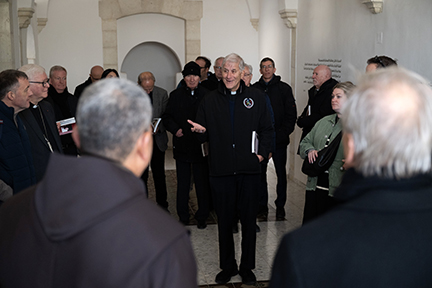
In the midst of our visit to the Latin Patriarchy, we heard from Father Gabriel Romanelli via Zoom. He is the pastor of Holy Family Parish in Gaza who has lived with the daily devastation since the war began. No one can reverse the unimaginable loss of life and the destruction of essential structures and infrastructure, but he is hoping that governments and NGOs can collaborate to begin the rebuilding process without delay. In his experience, each day that passes without the distribution of food, medicine and water is a death sentence for many who are extremely vulnerable. All people of good will are hoping against hope that the peace plan takes hold, and the weapons are put aside.
Another key facet of our pilgrimage were gatherings with those dedicated to reconciliation, justice and peace. In these dark times of war and devastation, voices for peace in Israel are given little credence from the majority of the population and have no chance at all among the hardliners and extremists. In many sectors of society, the peacemakers are not considered blessed, but treasonous for deviating from the prevailing standard of uncompromising retribution. This goes for the majority on both sides. Nonetheless, the voices and witness of The Rossing Center for Education and Dialogue, of Rabbis for Human Rights and the Defense of Human Dignity, and of the Parents Circle – Family Forum whose members, Palestinian and Israelis, have lost children to war and terrorism, and yet walk side by side, were all points of light and hope. Against all odds, they persevere with their vision for a sustainable and humane future and tirelessly work to impact the hearts and minds of the young, especially in the education system and other forums.
The final day for the Holy Land Co-ordination pilgrimage was in Bethlehem where the Christian population is greatly diminished, having been scattered to the four winds in recent decades. Many have left the city of the Lord’s birth and now live in the Diaspora, so to speak, likely never to return to their homeland. Nevertheless, we had the opportunity to visit a school for the deaf, the St. John Paul II Foundation, an educational institution for Christian youth, and the Latin Patriarch seminary that has recently reopened its doors to candidates from Palestine, Jordan and Cyprus. In these three diverse educational settings, hope is renewed in the eager faces of the children, youth and candidates for the priesthood. Of course, the generosity from Christians from afar is crucial for the survival of these institutions.
In conclusion, each evening the bishops and staff gathered for reflection, conversation and prayer. From this hour of prayerful listening to one another and to the Holy Spirit the accompanying statement was written to be distributed by our Episcopal Conferences and through our (arch)dioceses. In doing so, the fourth pillar of pressure/persuasion of the Holy Land Co-ordination is addressed. May the seeds that are planted through this unique pilgrimage in solidarity with many who cry out in this tortured land, produce a harvest of justice and peace.




